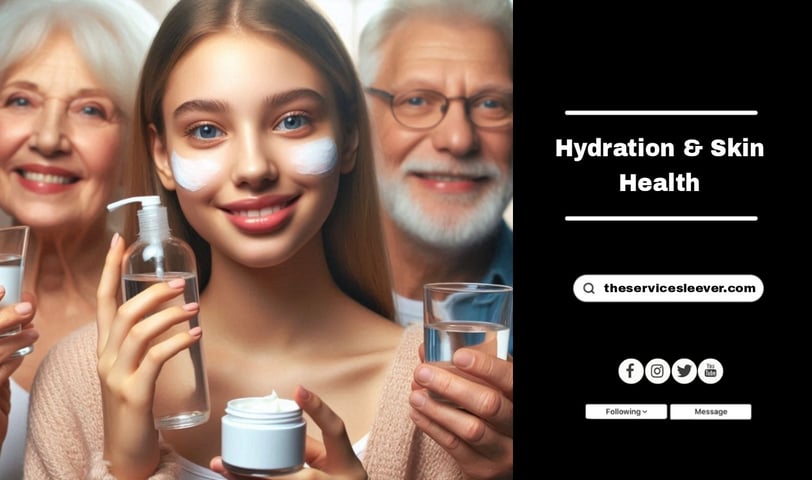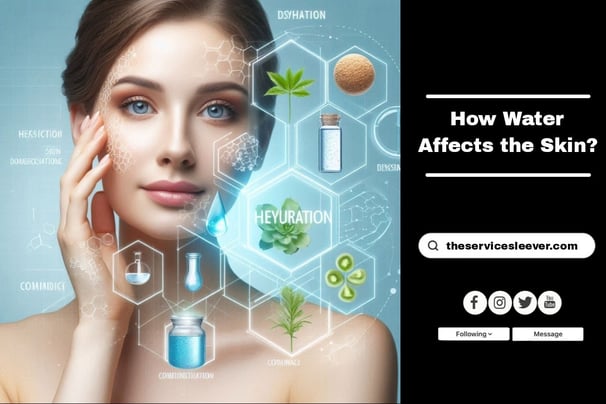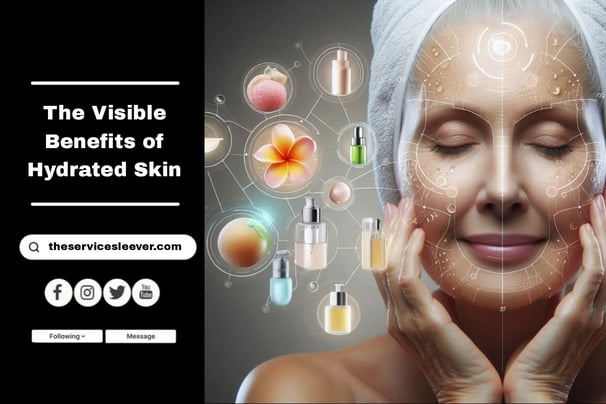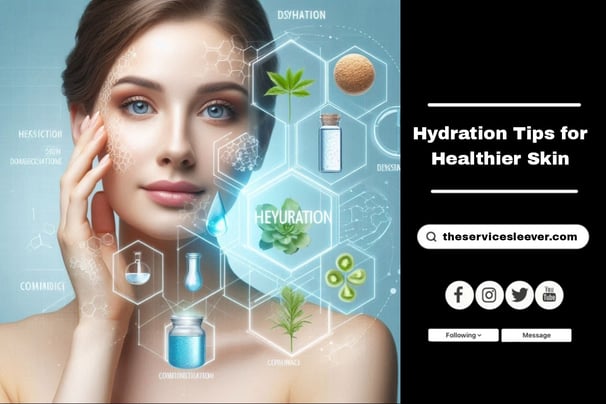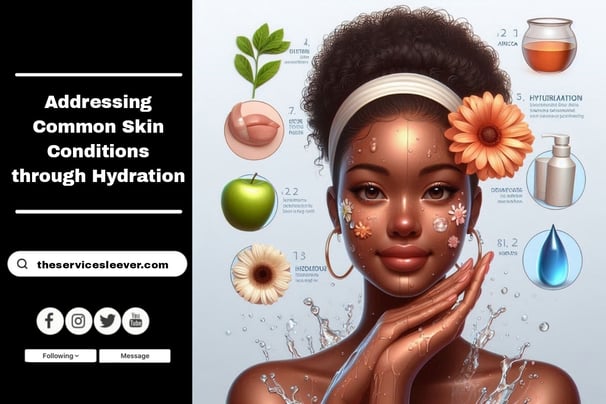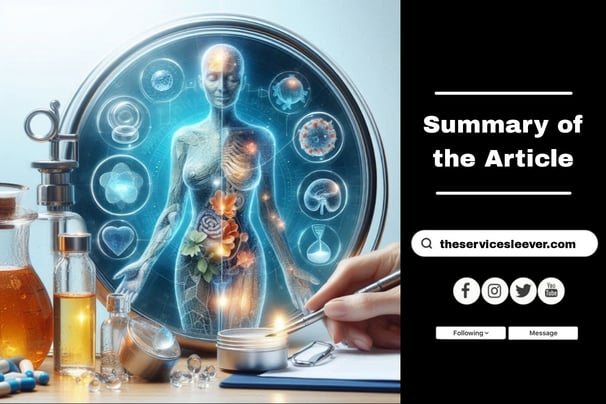Hydration & Skin Health
Discover how hydration and skin health are closely linked. Learn hydration tips, debunk myths, and address skin conditions to enhance your skin’s appearance and vitality.
HYDRATION
Introduction
Your skin is the largest organ in your body, and its health is closely related to your hydration levels. Staying hydrated can improve the elasticity of our skin and promote a glowing complexion, making a significant difference in the way your skin looks and feels. Hydration and skin health are deeply intertwined, as water plays an essential role in keeping skin cells functioning optimally.
Hydration and skin health are two factors that work together to produce youthful, glowing skin. Drinking plenty of water not only nourishes your skin from within. But it also aids in the elimination of toxins that can cause dullness or breakouts. Dehydrated skin often appears dry, flaky, and more prone to fine lines and wrinkles. Maintaining a proper hydration routine helps to support your natural barrier on skin and protects it from environmental stressors.
This article is going to look at the importance of hydration in skin health, including how water affects skin cells, the visible benefits of hydrated skin, and tips for keeping your skin moisturized from the inside out. Understanding the relationship between hydration and skin health is critical for achieving your skincare goals, whether you want to improve your complexion, combat signs of aging, or simply maintain a healthy glow.
How Water Affects the Skin?
| Understanding the Relationship of Hydration and Skin Health |
The relationship between hydration and skin health is far more complex than just drinking water. Water plays a vital role in maintaining the structure, function, and appearance of your skin. It is made that proper hydration is essential for overall skin health. So it’s important to look at how water impacts the skin at a cellular level to understand how hydration and skin health are connected.
Water is essential for maintaining the health and functionality of skin cells. Skin cells, like all other cells in the body, are primarily composed of water and must remain hydrated in order to maintain their structure. These cells become less elastic and more prone to injury when they don't get enough water. It can be a result of making a rough, dry appearance on your skin. Hydration and skin health are inextricably linked because water transports nutrients to skin cells and removes toxins, allowing the skin to regenerate and look younger.
Maintaining proper hydration levels helps your skin retain moisture, which shields it from environmental elements like pollution and UV radiation. This is why maintaining a balance between hydration and skin health is key to supporting the skin’s natural barrier function. A healthy skin barrier keeps irritants out and locks moisture in, preventing issues like redness, inflammation, and breakouts.
Conversely, dehydration can result in a variety of skin problems. Skin that is dehydrated feels tight, looks dull, and may be more prone to wrinkles and fine lines. The natural exfoliation process of the skin can be interfered with by dehydration, which can result in a buildup of dead skin cells and further uneven texture and tone. Figuring out the complex relationship between hydration and skin health will allow you to make more informed decisions about skin care. Internal and exterior hydration are both necessary for keeping a healthy, bright complexion, from drinking the proper amount of water per day to utilizing moisturizing cosmetics.
The Visible Benefits of Hydrated Skin
| Why Hydration and Skin Health Matter? |
The importance of hydration and skin health in obtaining a bright complexion cannot be emphasized. Hydrated skin not only feels better, but it also looks healthier, smoother, and younger. Sustaining appropriate moisture levels has advantages that go beyond just keeping your skin smooth. They also include enhancing suppleness, avoiding acne, and even lessening the visibility of wrinkles and fine lines. The following section will discuss the relationship between skin health and moisture and how it affects your complexion.
Improved Elasticity and Firmness:
Skin that is properly hydrated is more elastic and robust. The look of fine lines and sagging is lessened when your skin is well-hydrated because it retains its capacity to stretch and bounce back. Hydration and skin health are essential for preserving elasticity because water supports the structural integrity of skin cells, allowing them to keep their shape. As a result, the skin becomes plumper, firmer, and more youthful-looking.
A Radiant, Glowing Complexion:
A brighter, more radiant complexion is one of the most noticeable results of proper hydration. Skin that is well-hydrated has a natural glow because it reflects light more effectively. Hydration and skin health are important for encouraging good blood circulation, which aids in the delivery of critical nutrients to skin cells, resulting in a more even skin tone and a more lively appearance.
Reduced Fine Lines and Wrinkles:
Dehydration can make fine lines and wrinkles appear more apparent. The skin becomes less elastic and plump when it is dehydrated, which makes wrinkles more pronounced and apparent. Keeping your skin hydrated might help to reduce the appearance of these age indicators. The link between hydration and skin health is critical in keeping smooth, youthful-looking skin because water fills out cells and smoothed away fine wrinkles.
Fewer Breakouts and Clearer Skin:
Many people are unaware that dehydration can also be a factor in outbreaks and acne. Dehydrated skin may overcompensate by creating an excessive amount of oil, which results in clogged pores and imperfections. Reducing the chance of breakouts and encouraging smoother, more balanced skin can be achieved by striking a balance between moisture and skin health.
Softer, Smoother Texture:
Finally, properly hydrated skin feels softer and smoother to the touch. Your skin cells can shed dead skin cells and grow new ones more easily when they have adequate water in them. This results in a smoother texture and less dry, flaky skin or rough areas. Maintaining the balance between skin health and hydration keeps your skin smooth, nourished, and supple.
Thus, it is evident that maintaining hydration leads to firmer, more luminous skin, fewer wrinkles, and a smoother complexion. Prioritizing hydration and skin health can reveal the key to maintaining a youthful, bright appearance.
Hydration Tips for Healthier Skin:
| Optimizing Hydration and Skin Health |
Having bright, healthy skin is more than just using skincare products. It also involves keeping the proper ratio of internal to external hydration. Hydration and skin health are inextricably linked, which means that your daily habits regarding water consumption and skincare can have a big impact on the appearance and feel of your complexion. Here are some helpful suggestions to keep your skin bright and healthy while also maintaining ideal hydration and skin health.
1. Drink the Right Amount of Water for Your Body:
Ensuring you drink enough water per day is the most obvious tip for maintaining hydration and skin health in your body. The standard recommended for a grown person is 8 glasses or around 2 liters of water per day. However, your actual requirements may vary depending on factors such as activity level, climate, and body size. Recall that the state of your skin is a reflection of the general hydration level of your body. Therefore, maintaining internal hydration is essential for healthy, radiant, and plump skin.
2. Incorporate Hydration-Rich Foods:
Incorporating water-rich foods into your diet is an excellent method to improve hydration and skin health. Fruits and vegetables that are high in water content, such as watermelon, cucumbers, oranges, and strawberries, are also rich in vitamins and antioxidants that are good for your skin. Consuming these foods will provide your skin with a continuous supply of water throughout the day by assisting in the preservation of its moisture balance.
3. Apply moisturizer right away after cleansing:
Locking in moisture externally is also vital for long-term hydration and skin health. Apply a good moisturizer right after cleansing, when your skin is still slightly damp, to seal in hydration. Look for moisturizers containing Hyaluronic acid, Glycerin, or Ceramides, which are known for their ability to draw water into the skin and retain moisture for a long time.
4. Use a humidifier to combat dry air:
Indoor settings have the potential to dry your skin, particularly in the winter or in air-conditioned rooms. Use a humidifier to replenish the moisture in the air to preserve skin health and hydration. This prevents your skin from drying out over night by keeping it hydrated, especially as you sleep.
5. Hydrate First Thing in the Morning:
Starting your day with a glass of water is a simple yet powerful way to kickstart hydration and skin health. Your body loses water overnight. So the rehydrating should be the first thing in the morning to help refill your hydration levels. This sets the stage for healthy skin all day long by waking your body up and providing it with an early dose of moisture.
6. Don’t forget to Hydrate Your Lips and Eyes:
Don't forget to moisturize and take care of your lips and under-eye circles while considering skin health and hydration. These regions are especially vulnerable to dryness. Use hydrating eye creams with ingredients like peptides and cooling gels, and always keep a moisturizing lip balm on hand to prevent cracking and dehydration in these delicate areas.
7. Protect Your Skin Barrier:
A strong skin barrier is necessary to keep moisture in and environmental irritants out. Use skin-protective barrier-strengthening products, like those containing Niacinamide, Ceramides, and fatty acids, to maintain your skin health and hydration. Over-exfoliating can strip the skin of its natural oils and damage the barrier, making it more difficult for your skin to retain moisture.
8. Adjust Your Hydration Routine Based on Climate:
Your hydration and skin health requirements will vary according to the season and environment. Colder, drier climes may call for thicker creams and extra layers of hydration, such as serums or hydrating masks. In warmer, humid weather, you might need to drink more water and use lighter moisturizers. Always adjust your hydration regimen to your skin type, taking into account the climate and the time of year.
Good hydration practices on the inside as well as the outside are necessary to maintain optimal hydration and skin health. You can make sure your skin stays hydrated, smooth, and radiant by using the proper skincare products, eating meals high in water content, and drinking plenty of water. Follow these recommendations, and you'll be on your way to healthier skin in no time.
Addressing Common Skin Conditions through Hydration!
Many people don't consider the importance of keeping adequate hydration and skin health when treating common skin disorders. Staying well hydrated can help reduce symptoms and enhance the overall appearance of your skin. Dehydration can worsen or even cause a variety of skin conditions. Let's examine the relationship between skin health and hydration in treating common skin issues including eczema, acne, and early aging.
Acne and Breakouts:
Many people are unaware that dehydration can contribute to acne breakouts. Insufficient moisture can cause the skin to overproduce oil, which can clog pores and increase the frequency of breakouts. Controlling oil production and minimizing acne flare-ups can be achieved by striking a balance between skin health and moisture. Drinking enough water and using non-. comedogenic moisturizers can help keep your skin hydrated and clear without overloading it with heavy, pore-clogging products.
Dryness and Eczema:
Dry, itchy, and irritated skin are hallmarks of eczema, a disorder intimately associated with the skin's incapacity to hold moisture. The relationship between hydration and skin health is especially important for people who have eczema since well-hydrated skin can better retain its barrier function, lowering the incidence of flare-ups. Use thick, moisturizing lotions and ointments to help seal in moisture and shield the skin from irritants in addition to drinking lots of water to help treat eczema.
Psoriasis:
Improved skin health and hydration can also help psoriasis, a disorder that results in thick, scaly areas on the skin. Although psoriasis cannot be cured by water alone, moisturizing the skin can help dissolve scales and lessen inflammation. Drinking enough water and using moisturizing lotions or creams with ingredients like urea or salicylic acid can help alleviate the discomfort associated with psoriasis and make the skin look and feel smoother.
Fine Lines and Early Aging:
A prominent indicator of dehydration is the development of wrinkles and fine lines. Lack of moisture can cause your skin to become less elastic and plump, which accentuates fine wrinkles. These aging indicators can be minimized by focusing on hydration and skin health. You can replenish moisture and maintain the youthful, radiant appearance of your skin by using hydrating serums containing hyaluronic acid, wearing moisturizing creams, and drinking plenty of water.
Sunburn and Irritation:
You may experience redness, inflammation, and peeling after prolonged sun exposure due to skin dehydration. After a sunburn, hydration is crucial to accelerating the healing process and lowering inflammation. Drinking water helps replenish lost fluids, while topical moisturizers soothe the irritated skin and restore its moisture levels. The key to controlling UV damage and accelerating skin recovery is understanding the connection between skin health and hydration.
Rosacea:
Rosacea, a condition that causes redness and visible blood vessels on the face, can be aggravated by dehydration. Hydrating both internally and outside can help to soothe the skin and lessen the intensity of rosacea symptoms. The connection between hydration and skin health is important for rosacea sufferers, as drinking water and using gentle, hydrating products can help soothe the skin and prevent flare-ups.
Improving skin health and hydration can be greatly enhanced by taking care of skin issues through appropriate hydration. Keeping your skin well-hydrated from the inside out will help heal, reduce inflammation, and encourage a healthier complexion, whether you're battling eczema, acne, or the effects of aging. Understanding the importance of hydration and skin health will help you take better care of your skin issues and have a healthy, radiant look.
Summary
Finally, the irrefutable link between hydration and skin health should be a foundation of your skincare routine. Hydration is crucial for keeping skin healthy, whether your goal is to have a radiant complexion, reduce the appearance of aging, or treat certain skin issues like eczema or acne. Drinking enough water, using hydrating skincare products, and tailoring your routine to meet your skin's unique needs are all critical steps to support the delicate balance between hydration and skin health.
Staying hydrated inside and out helps you achieve obvious improvements by boosting elasticity, decreasing fine lines, alleviating skin problems, and fostering a bright glow. As you've seen throughout this guide, proper hydration not only benefits your skin’s appearance but also enhances its overall function and resilience. Prioritizing hydration and skin health year- round, regardless of weather or environmental factors, is key to maintaining youthful, vibrant, and smooth skin.
You may make decisions that improve the texture, tone, and vitality of your skin over time by being aware of the science underpinning hydration and skin health. Implement the tips shared here, stay consistent with your hydration habits, and watch as your skin reaps the rewards of a well-hydrated, healthy lifestyle.
................................END OF THE ARTICLE..........................
